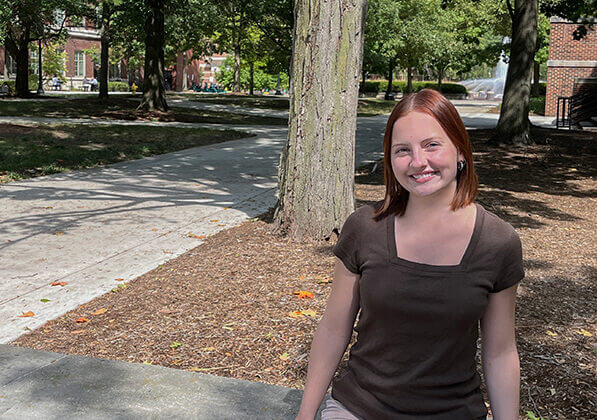Purdue undergraduate researcher explores how service animals can help promote psychosocial well-being of sexual assault survivors
Emma Senter, a Purdue University Department of Psychological Sciences junior, has always considered herself an animal person. So, when she had the opportunity to join the Human-Animal Partnerships and Interactions (HAPI) Lab in the College of Veterinary Medicine, she jumped at the chance.
While Senter, a brain and behavioral sciences major in the College of Health and Human Sciences, doesn’t work with the canines, her work with their human companions has helped her see the applied and interdisciplinary aspects of her field.
“We’re advocating for the option of having service dogs as part of a treatment modality for PTSD and overcoming sexual assault trauma,” Senter said. “I interact with the people. I’ve conducted interviews with the participants just asking them about their experiences, the process of getting their service dog, how their service dog assists them in their day-to-day life and the changes that have come from that, and the advantages and disadvantages of having a service dog in 2025.”
The work, which is done under the mentorship of Dr. Leanne Nieforth, a Purdue Veterinary Medicine assistant professor in the Department of Comparative Pathobiology, investigates how a psychiatric service dog partnership can serve as a potential intervention for survivors of sexual assault. The work is funded by a Research Breakthrough Award from the John Martinson Honors College.
Participants in the study began by completing a national survey. Then, those participants who agreed to an interview would be asked to send two photos of themselves with their service dog that illustrate their relationship and the impact the animal has had on their life. This method, called autophotography, allows participants to give the research team a glimpse into their experiences. This research is a part of Purdue’s presidential One Health Initiative that involves research at the intersection of human, animal, and plant health and well-being.

“It’s been fascinating because even though we only ask for two, a lot of the participants will send more, like 10,” Senter said. “It’s heartwarming and so inspiring just to hear the experiences of people who have gone through something traumatic like sexual assault and survived it and how they are taking advantage of an animal interaction as an alternate therapy modality when medication or talk therapy fail or aren’t as successful as they would like it to be.”
For Senter, who hopes to have her own counseling practice one day, being a part of the work has opened her mindset to new intervention methods.
“It’s amazing because I’m so immersed in the research process,” Senter said. “I’m very fortunate to be able to interact with and interview the participants. I’m contributing to the data analysis. I’m coding. I’m really doing the work.”
Because of the interdisciplinary nature of the work, bringing together students across a variety of areas on campus from Science to Agriculture to Health and Human Sciences, Senter has seen how her major interacts with other fields to help drive innovation.
“Psychological Sciences overlapping with Vet Med — combining those fields only strengthens the evidence,” Senter said. “It’s a very unifying experience because a lot of the students in the lab are in different majors. It’s very diverse, but we’re all interested in the core idea that this interdisciplinary work is so important.”
Senter noted that, as she has dived headfirst into the research world, she has appreciated how Dr. Nieforth has been very encouraging, creating a welcoming and supportive lab environment for her students.
“Throughout Emma’s time in the lab, I’ve seen her embrace new topics and unfamiliar challenges with determination,” Dr. Nieforth said. “It’s been inspiring to watch her grow — not only in her overall research knowledge and skills but also in confidence, self-awareness and curiosity.”
Research experiences like what’s she’s found in the HAPI Lab are what initially drove Senter to Purdue from her home in Ohio.
“They have some of the best research opportunities for undergraduates in the country,” Senter said.
While the research team is still analyzing the data to unpack the results, Senter said she’s excited to see the impact of the work, even in her own academic journey.“It’s given me a wealth of knowledge that I wouldn’t have if I didn’t apply for the position in the lab,” Senter said. “The findings so far are inspiring. It’s fascinating and heartwarming to hear the perspectives, stories and experiences of the participants because they’ve been through a lot — and even just the overall impact their service dog has had on their lives.”

